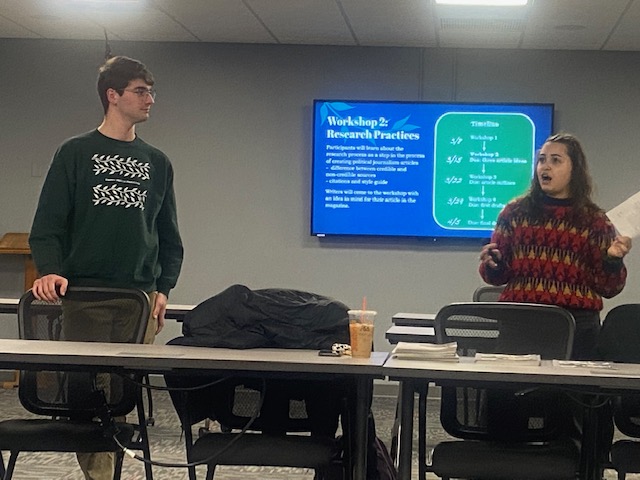Rhetoric and respect: Learning a better way to engage in political discussion
Harpur students teach workshops in political science writing at local schools

In an atmosphere of heated political rhetoric, how can we turn down the temperature and explain our views rationally and respectfully? And how can we determine whether what we read about politics is factual?
Fostering respectful, high-quality conversation is the mission of Happy Medium Magazine, an independent, non-partisan publication run by Binghamton University students. They now plan to expand into a publishing group with a variety of platforms for political communication.
First stop: the Chenango Valley school district, the pilot site for Happy Medium’s High School Magazine Development Program.
This semester, two members of the Happy Medium team — philosophy, politics and law major Trevor Fornara and political science major Amanda Escotto, both seniors — are offering political science writing workshops at Chenango Valley (CV) middle and high schools. At the end of the workshops, the younger students will produce their own political science magazine and form an ongoing club — much like the one at Binghamton.
“Our mission is to create a space for all Binghamton students to respectfully and productively discuss the politics of our nation and world,” said Fornara, Happy Medium’s founder and editor-in-chief. “Through this program, we’ve redefined ‘Binghamton students’ to include all students in the broader Binghamton community, not just University students.”
The program is funded by a Community Engagement Faculty Teaching and Research Enrichment Grant from Binghamton’s Center for Civic Engagement. Fornara and Escotto are working with Writing Initiative lecturer Heather Dorn as their faculty advisor.
Educators are concerned about pandemic-related disruptions that left some students less prepared for college-level work than in the past, Dorn said. The research and civic writing skills CV students acquire through the program are similar to what they will need as first-year college students, which helps bridge the gap.
They’re not the only beneficiaries. University students also gain valuable skills in teaching, presenting and mentoring, and a grounding in pedagogy and lesson-planning. Faculty members may benefit, too.
“This program is also meant to serve as research into how professors from other departments or disciplines might implement similar programs,” Dorn said.
Finding their own ‘Happy Medium’
The concept of non-partisan political writing is difficult for a lot of people, said Escotto, who will pursue her master’s degree in public administration at Binghamton this fall through the 4+1 program. If someone has a strong passion for a particular issue, they’re most likely viewing it with some sort of bias, she acknowledged.
“It can be hard to ask someone to reflect on their own bias and take other perspectives into consideration when their opinions are already so strong,” she said. “Part of our job is to illustrate why it is crucial for meaningful non-partisan journalism to consider a diversity of arguments in order to be reliable and hold the audience’s trust.”
Their workshops are intended to do just that. Following an information session, the series includes four installments: an introduction to political journalism, research practices, productive and respectful political discourse, and the magazine editing process.
The high school students’ end product will differ from Happy Medium’s own flagship publication. For one, the younger students are settling on their own identity and editorial guidelines, with help from Fornora and Escotto; the magazine will be called Valley Unveiled. Several high school students are being trained in the production process and the ins-and-outs of copyediting.
Unlike Happy Medium proper, which focuses on objective political journalism, the CV publication — scheduled for release in late April or early May —will contain only opinion pieces, although writers are encouraged to research article topics first and explore all sides of an issue before developing their thesis. That gives students the chance to write about topics that they feel passionately about while achieving the aims of the Seal of Civic Readiness, a New York state initiative that fosters understanding of participatory government, civic responsibility and civic values.
“As New York state’s Seal of Civic Readiness initiative rolls out to more schools, we expect there to be an increased demand for these types of extracurricular civic-learning programs,” Fornara said.
To that end, the Happy Medium team designed the program so that it could easily be expanded to other schools. Fornara will begin a year-long fellowship in the Center for Civic Engagement this June, and will continue to work with the CV students over the next year as they transition to an extracurricular club.
“Our work with Trevor and Amanda at Happy Medium has not only provided our students with skillsets in how to be researchers and writers, but has also shown our students how an authentic project comes to life,” said Chenango Valley Interim Superintendent Michelle Feyerabend. “While this experience is providing students with an opportunity to earn a Seal of Civic Readiness on their diplomas at graduation, it is also showing them how to advocate in a productive way with both high school and middle school students working together to create a product that the entire school can enjoy.”
It’s important to provide a platform for adolescents to discuss political issues that are important to them, Escotto said.
“With a contemporary political culture that continues to be heavily polarized, discussions of politics can be touchy or uncomfortable — even alienating. I want to be a resource for these students who are so expressively intrigued by journalism, as they are at an age where they are in the process of finding their voice in writing,” she said. “Learning how to write concise and meaningful work had made all the difference in my intellectual and academic development, so being able to pass on some of my knowledge to those younger than me is definitely a personal objective.”

